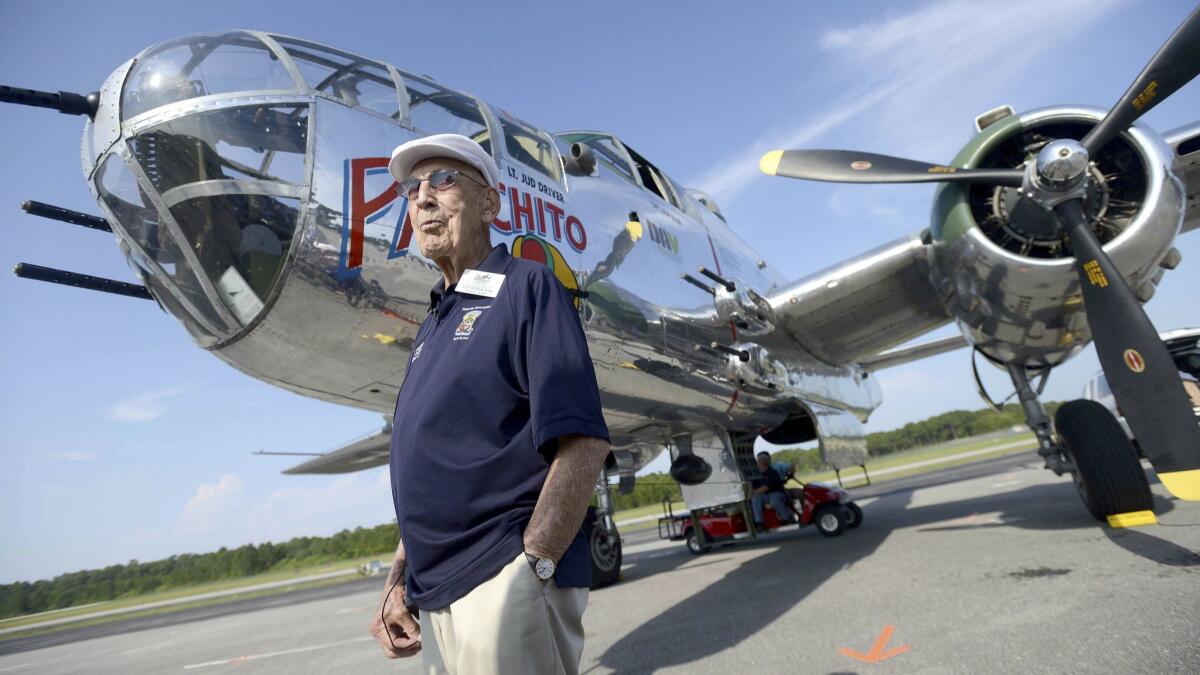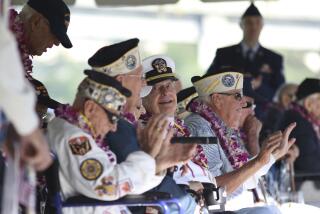Richard Cole, the last of the WWII Doolittle Raiders, dies at 103

- Share via
Richard Cole, the last of the 80 Doolittle raiders who carried out the daring U.S. attack on Japan during World War II, died Tuesday at a military hospital in Texas. He was 103.
Cole was mission commander Jimmy Doolittle‘s co-pilot in the attack less than five months after the Dec. 7, 1941, Japanese bombing of Pearl Harbor. The attack on the Tokyo area was credited with giving the U.S. a psychological lift after the shock of Pearl Harbor.
Cole had dreamed of being a pilotm and after attending Ohio University enlisted in the Army Air Corps in 1940. Stationed in South Carolina, he signed up as a volunteer for a secret mission he knew would be dangerous, but not much else about. They trained at the Eglin Air Force Base in western Florida to fly B-25 bombers on short takeoffs, in preparation for flying off an aircraft carrier.
The raiders launched their April 18, 1942, assault in B-25 bombers from the deck of the USS Hornet. Suspecting they had been detected by Japanese patrols, they took off farther from Japan than at first planned.
The crews of the 16 planes were “very quiet” as they neared Japan, Cole recalled. Doolittle soon ordered the bomb bay doors opened, and the attack was on in the face of what turned out to be limited anti-aircraft fire in the surprise attack.
The planes then headed to China, running low on fuel. Cole said Doolittle gave the command to prepare to bail out as they neared the coast. “I wish you all good luck,” Doolittle said.
Cole said it was terrifying to parachute into the dark unknown in rough weather. His parachute caught in a tree, he recalled, leaving him dangling but safe. Chinese partisans helped lead him and other raiders to safety.
Three members of the raiders died trying to reach China, and eight were captured by Japanese soldiers. Of those, three were executed and another died in captivity; four survived the war.
Cole recalled that Doolittle was distraught at first, upset that he had lost all of his planes and some of his men. Doolittle would later receive the Medal of Honor.
The raid inflicted scattered damage while providing a psychological lift back home. The stunned Japanese military diverted resources after a string of Pacific successes.
“Seven decades later, we are still awed by the sheer audacity of the Doolittle raid and the incredible men whose grit and bravery made it possible,” House Speaker Nancy Pelosi said when the Congressional Gold Medal was awarded to the Raiders. “Though time has thinned their ranks, it will never dim the daring of their deeds.”
Cole continued to fly missions in the China-Burma-India theater until 1944, and had peacetime service assignments in several states.
Doolittle, who died in 1993, organized reunions that became annual affairs, and Cole was a regular. He also took part in other special events, including leading a special public “final toast” ceremony at the National Museum of the U.S. Air Force in 2013.
Cole will be buried at Arlington National Cemetery.
More to Read
Start your day right
Sign up for Essential California for the L.A. Times biggest news, features and recommendations in your inbox six days a week.
You may occasionally receive promotional content from the Los Angeles Times.






